- Home
- Barbara Pym
A Glass of Blessings Page 8
A Glass of Blessings Read online
Page 8
'We'll build in sonnets pretty rooms,' said Piers strangely. 'And now I really should call in at the press to see if anything has come in for me.'
'Might something have come in this afternoon?'
'Today,' said Piers. 'I haven't been in all day, I'm afraid.'
'Should you have been?'
'Certainly I should.'
'Then why haven't you?'
'Wilmet, when you work for your living - and I hope you may never have to - you find that there are some days when you can hardly bear to do your work, and others when you definitely cannot bear to. This has been one of those days. I woke up this morning knowing that I couldn't bear it, so I didn't go.'
I hardly knew what to say. Neither sympathy nor reproach seemed quite what was called for. I found myself thinking that if he hadn't been at work at all he really had no excuse for being so late for lunch. I also felt that I had not done very well by distracting him when he might have gone to work in the afternoon. But then I had not known the circumstances. Perhaps I had helped to make him a little happier by my company and that might be something.
'Will you come in?' he said, as we approached the press.
'Yes, I'm rather curious to see where you work.'
'Or don't work!'
We went up a dark narrow flight of stairs, and Piers led me into a mean little room where a middle-aged man and an elderly woman sat reading with green-shaded lights pulled low over their tables. Long strips of galley proof were festooned over chairs and tables, and some had slipped on to the floor. I noticed an untouched cup of tea, now cold and grey-scummed, on the windowsill.
'Ah, Mr Longridge, we are honoured.' The elderly lady spoke without looking up from her work.
Obviously this could not be the colleague with whom Piers shared a flat. Nor did it seem likely that it was the middle- aged man, who was muttering to himself, taking no notice of us.
'We were wondering if we should send out a search party,' said the woman, whom Piers had introduced as Miss Limpsett. 'Your tea was poured out and ready at a quarter to eleven and still you did not come. Mr Towers began to do some of your work, but of course he could not manage the Portuguese.' She took off her spectacles and rubbed her eyes. 'I have been reading Greek all day - really, I am quite tired. And I have got a nice chop for my supper. I think I shall go home.'
I saw that she also had a popular women's magazine in her basket, and was glad to think of her escaping into a world of romance after her dreary day at the press.
Piers picked up a bundle of proofs. 'I shall take these home with me. I do sometimes work at home,' he added when we were out of the room. 'Miss Limpsett and Mr Towers are not the most stimulating of companions.'
'Have you always done this work?' I asked.
'Nobody has always done it. Mr Towers was once a clergyman and had a preparatory school. Miss Limpsett looked after her old father, a considerable scholar, until he died. Then it was discovered that all his years of tyranny had given her the means of earning some kind of living. I mean better than she could have earned as a servant or companion. Now she gets her own back by raising obscure queries which drive the authors into a frenzy. But the printers' readers must assert themselves somehow.'
I felt depressed by what I had seen, and wished I could have gone straight home after tea. I did not like to think of Piers working in such surroundings.
'I imagine the person you share your flat with wasn't either of those two,' I said, with an attempt at laughter.
'No, it certainly wasn't,' said Piers.
'I must go home,' I said. Thank you for the afternoon.'
'I'm glad you enjoyed it,' he said without much interest. He seemed now to be distant and withdrawn, and I felt I should not extend an invitation to dinner or suggest any future meeting.
'Here is a taxi coming,' I said. I think I'll take it. The rush hour will have started, won't it?'
'Yes, and the pubs will be open.'
The taxi took me away, and my last glimpse of Piers was of him standing on the edge of the pavement with the bundle of proofs in his hand.
When I got home Sybil greeted me in an unusual way.
'Falo, falas, fala, falamos, falais, falam,' she recited. 'I suppose you will have learnt more than that this afternoon.'
'I don't know,' I said, for now that it was all over I hardly knew how to describe my lunch and afternoon with Piers. I felt that I could tell Sybil about the furniture depository - she would like that - but not about the confusion of pleasure, sadness, uneasiness and expectation that the day seemed to have left behind.
Chapter Six
November came upon us with all its usual fogs and dreariness, the approach of winter and the shortening days bringing a corresponding depression of spirits. I saw nothing more of Piers except in his capacity as a teacher of Portuguese. He made no special effort to talk to me after the classes, and pride prevented me from joining the group which crowded round him asking what seemed the most silly and obvious questions. We went through all the tedious beginnings of learning a language, with everything in the present tense and the personnel peculiar to grammar books - the father, the mother, the uncle, the aunt, the professor, the dog, the blackboard, the pencil, the pen. Occasionally, when he was in a good mood, Piers would digress and tell us about Portuguese wines or the odd things Brazilians said when they spoke the language. I had not expected that the cosiness of the afternoon by the river would be repeated, and it was no doubt just as well that it should not be, but I found myself wondering whether Piers did not sometimes want to see me again as he had apparently enjoyed my company on that occasion. I had really no idea what he did in his spare time, apart from drinking, or who his friends were, and although I planned to ask him to dinner to meet Rodney and have a pleasant civilized evening, the weeks went by and I did nothing about it.
One morning I received a card from the blood transfusion centre asking me to attend a session the following week. I had quite forgotten that I had filled in a form which Mary Beamish had given me some time ago, but now the idea of giving blood seemed exciting and I looked forward to the experience like a kind of treat. On the day I was to go, Mary rang up and said that she would come with me. It was too soon after her last session for her to give blood, but she had thought I might feel strange, not having been before.
We were to attend the afternoon session and Sybil made me eat a particularly large lunch. She seemed to think that it would enrich my blood and make it all the more valuable to some dying person.
'I was very much afraid I shouldn't be able to get away,' Mary chattered as we met at the bus stop. 'Mother was in one of her restless moods, but eventually I got Miss Prideaux to come and sit with her so she'll be all right till I get back. In fact, Miss Prideaux very kindly promised to give her her tea so I really needn't hurry back. I've got them some crumpets, and Mother always likes those.'
I saw old Mrs Beamish with the butter running down her chin, licking her fingers.
'Here we are, said Mary brightly, 'this is where we get off.'
The hospital was next door to a church and the blood donors' centre was in the crypt. We went down some steps and along a passage whose walls were adorned with eighteenth- century memorial tablets. It seemed fitting that we should be going into a kind of charnel house to give our blood, but the room we entered was all bustling efficiency, lit with strip lighting and hygienically clean. Only the patches of damp on the greenish distempered walls gave any hint that we were in a crypt. Several people were lying on beds, others sat on chairs clasping bottles which bore different coloured labels. Two men in white coats sat at a table receiving the donors as they came in, and joking as they made out cards and took drops of blood from pricks in our fingers.
As we waited I studied the people round me, who were of all types and ages, trying to decide whether they all had some air of nobility in common. I came to the conclusion that while some were young, the majority were of the burden-bearing type, middle-aged and tired-looking, the s
ort of people who would take on yet another load in addition to all the others they already bore.
Soon my turn came and I found myself lying on one of the beds while a nurse rolled up my sleeve and fixed a kind of tourniquet on my left arm. Then a disconcertingly young looking doctor pricked me with a needle, fixed a tube and told me to squeeze the block of wood I was holding. I lay back and stared at the ceiling preparing to meditate until the right amount of blood should have gone out of me.
But suddenly there was a disturbance at the door. Raising my head a little I saw that a tall rather mad-looking woman in a bushy fur coat and red hat was arguing with the men in white coats.
'I really cannot wait in the queue. I am Miss Daunt,' I heard her say in a loud ringing tone. 'My blood is Rhesus negative, the most valuable kind. I have a letter from the Regional Director.' She seemed to fumble with a paper, then raised her voice. 'This precious blood,' she read, 'that is the phrase used. And you expect me to wait here behind all these people! Why somebody might be dying for want of my blood while I sat here waiting! How would you feel if that were to happen?'
I did not hear the men's answers, if indeed they gave any - I supposed they might have a kind of professional indifference to death - but Miss Daunt apparently gained her point and soon appeared on the bed next to mine, flinging off her coat with a gesture and baring her arm triumphantly.
'This precious blood,' she murmured, and began muttering to herself, first about her blood and then about irrelevant things which I could only half hear - a quarrel with somebody about a broken milk bottle and what they had said to each other. It seemed like a 'stream of consciousness' novel, but I was relieved when she stopped talking for I had been afraid that she might address me. Virginia Woolf might have brought something away from the experience, I thought; perhaps writers always do this, from situations that merely shock and embarrass ordinary people. And after all, Miss Daunt was probably only a little odd. Nevertheless I was glad when I was lying down in another room, drinking rather too sweet tea. I was sure that Miss Daunt would have refused indignantly had she been asked if she wanted to lie down after she had given her blood.
'Now you mustn't rush away too soon as it's your first time," said Mary fussily.
'Not like you did that morning at the Settlement,' I reminded her.
'I feel quite dashing having the afternoon off,' said Mary. 'Are you doing anything afterwards?'
'Well, I don't know really,' I said cautiously, wondering what she was about to suggest.
'I was just wondering if you would like to come and help me to choose a dress,' Mary went on. 'I really do need a new one, you know - a sort of wool dress suitable for parish evening occasions.'
'A sort of wool dress suitable for parish evening occasions' - I turned the depressing description over in my mind. Poor Mary, was that really all the social life she had? I supposed that it must be.
'Mother was saying that my blue is so shabby that I must get something else.' She mentioned the name of an old- established but fashionable shop where her mother had an account, so we made our way there. I was surprised, knowing the shop, that Mary did not appear better dressed.
'I usually go to the sales,' she added, explaining what I wanted to know. They have some very good reductions, but I suppose I shall have to pay more now.'
Obviously, then, it was Mary and people like her who bought the trying electric blue or dingy olive green dress which had been reduced because nobody could wear it. And she probably gave the money she saved to the church or some charitable organization. And I bought as many clothes as I wanted in all the most becoming styles and colours, gave a little money to the church and none at all to charitable organizations. The contrast was an uncomfortable one and I did not wish to dwell on it. It was better when we were engulfed in the perfumed air and soft carpets of the shop, and Mary, like a schoolgirl being taken out for a half holiday, was excitedly calling my attention to the various counters.
'What lovely scarves! The colours are so pretty now, aren't they? And all these beads and jewels - it's like Aladdin's cave, isn't it!' she chattered. 'But I suppose dresses will be upstairs, so we'd better not waste time down here.'
We entered the 'gown salon', which was rather empty at this time of the afternoon; acres of grey carpet seemed to stretch in front of us. A black-gowned saleswoman advanced upon us and addressed her offer of help to me.
'Well, it's really I who want to be helped,' said Mary in her open way. 'I just want an everyday wool dress in blue or green, nothing too elegant.'
'Have you ever considered black?' I asked when the saleswoman had gone away to get some dresses. 'I think it would suit you.'
'Do you?' asked Mary doubtfully. 'I've never worn it, except when Father died. Mother doesn't consider it suitable for girls. I mean,' she smiled, 'she didn't when I was a girl - so I've nearly always had blue or green.'
She tried a few dresses which fitted quite well but were uninteresting. Then I asked the saleswoman to bring something in black. I wondered why I was taking all this trouble over Mary Beamish, for when one came to think of it what did it matter what she wore? She might just as well buy a dress as much like her old blue as possible, for all the difference it would make to her life.
But when the black dress was brought it fitted best of all, and the plain bodice and full pleated skirt were very becoming.
'The neckline is rather severe,' said Mary critically. 'Still, I suppose it would do for church functions.'
'Well, madam, it would be just the thing for anything like that,' said the saleswoman, smiling ingratiatingly. 'Clergymen do wear such a lot of black, don't they?'
'This aspect of the situation had not occurred to either of us, and we could not help laughing at it.
'And you could always dress up the neckline with pearls,' I said enthusiastically, like a fashion magazine.
'Yes, I have the string Father gave me on my twenty-first birthday,' said Mary.
'Oh, not English gentlewoman real pearls,' I said. 'I mean artificial ones like we saw downstairs - two or three strings at least - perhaps pink ones, they would give you a kind of glow.'
'Do I want to have that?' Mary asked with a smile.
'Surely all women want it,' I said, wondering if this were true.
'Of course, I don't use make-up, except for a little powder,' said Mary. 'I never have, really. I suppose it would improve me.'
I made a noncommittal answer.
'I think it would only make me feel awkward if I started to use it now,' Mary went on, 'and I don't know what Mother would say.'
She decided to take the black dress away with her, and I also persuaded her to buy a necklace to go with it - a double row of pearls by the faintest tinge of pink in them.
'I don't know when I shall wear them,' she laughed.
We turned into a side street where I knew of a good place to have tea, a favourite haunt of shopping women. It was already crowded but we managed to find a small table to ourselves, sitting on a narrow green banquette wedged against the silver- striped walls.
'This place is really for women, isn't it,' whispered Mary, pointing out a rather uncomfortable-looking husband with his wife's parcels piled on his knee. That poor man looks so miserable.'
At that moment a young clergyman with an elderly woman, presumably his mother, came in. The two men looked at each other as specimens in a zoo might, each commiserating with the other in his unhappy situation.
'I suppose very few men are free to come out to tea in the middle of the afternoon,' I remarked, 'and they let themselves be led by their women. But clergymen must have quite a lot of free time in the day - what do they do with it all, I wonder? Certainly one doesn't see great droves of them having tea in this sort of place. Perhaps they go to the pictures?'
'They aren't really free,' said Mary seriously. 'They have to visit in the parish, you know. Father Bode does a great deal of visiting in the afternoons. He told me that if he does it in the evenings he finds that people
are looking at the television and don't like to be interrupted.'
'Does Father Ransome do much visiting?' I asked.
'I don't think he has yet,' said Mary. 'But he spends a lot of time at the clergy house so we don't see him very much.'
I thought I detected some confusion in her manner. She had seemed to hesitate, as if wanting to tell me something but not quite being able to bring it out.
I suggested another cup of tea, and after we had started to drink it I began to ask her more about Father Ransome, hoping for the revelation of some interesting personal details about him.
'He's always very friendly,' she said evasively. 'We sometimes ask him to coffee in the evenings.'
'Are his rooms self-contained?' I asked.
'No, but there is a bathroom up there, and a gas ring in his sitting-room. I went up one day and had a cup of tea with him,' she said shyly.
I wondered what Mrs Beamish had thought of that.
'Mother had gone out to tea with Miss Dove and Mrs Pollard - they came to fetch her in their car,' Mary explained quickly.
'And was it fun - I mean, did you like having tea with him?' I asked.
'Yes, he was very interesting - telling me about his experiences in the East End and in North Kensington,' said Mary seriously. Then her face reddened and she brought out in a kind of rush, 'He asked me to call him Marius, but I don't feel I can, somehow.'
'Why not?' I said lightly enough, though I was conscious of a feeling of annoyance at her revelation. 'Did he just ask you without any warning, as it were?'
'Yes, it was when I was going downstairs. I suppose I said, "Well, Father, thank you for the tea", or words to that effect, and then he asked me to call him Marius.'
'I think calling him Father is a bit much,' I said.
'But it is what he is, Wilmet, even though he is younger than Father Thames and Father Bode. Marius is such a peculiar name for a man though, isn't it. And then my own name being Mary - I suppose I got confused and thought it would sound silly if I asked him to call me Mary.'

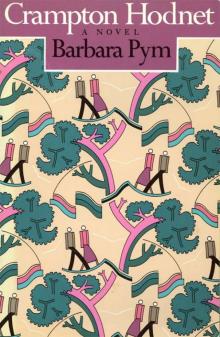 Crampton Hodnet
Crampton Hodnet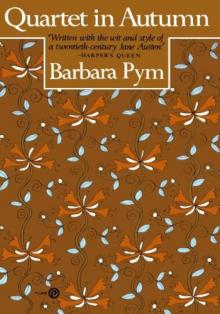 Quartet in Autumn
Quartet in Autumn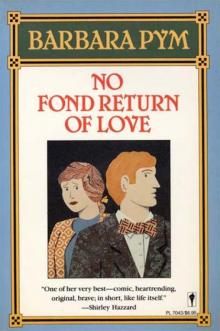 No Fond Return of Love
No Fond Return of Love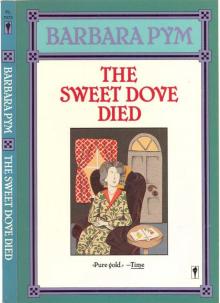 The Sweet Dove Died
The Sweet Dove Died Excellent Women
Excellent Women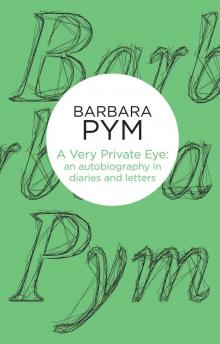 A Very Private Eye: The Diaries, Letters and Notebooks of Barbara Pym
A Very Private Eye: The Diaries, Letters and Notebooks of Barbara Pym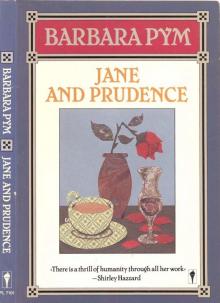 Jane and Prudence
Jane and Prudence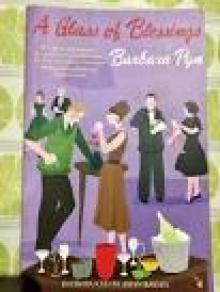 A Glass of Blessings
A Glass of Blessings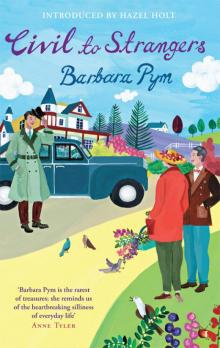 Civil to Strangers and Other Writings
Civil to Strangers and Other Writings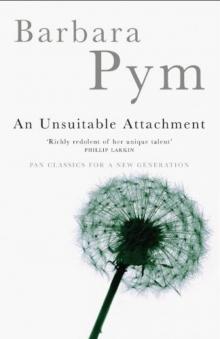 An Unsuitable Attachment
An Unsuitable Attachment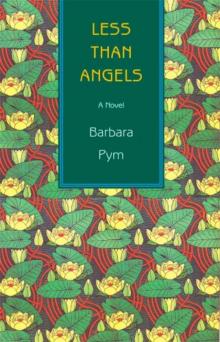 Less Than Angels
Less Than Angels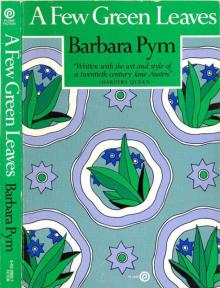 A Few Green Leaves
A Few Green Leaves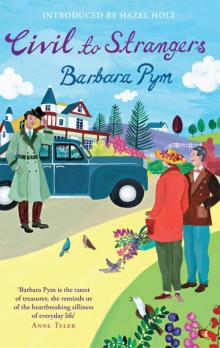 Civil to Strangers
Civil to Strangers